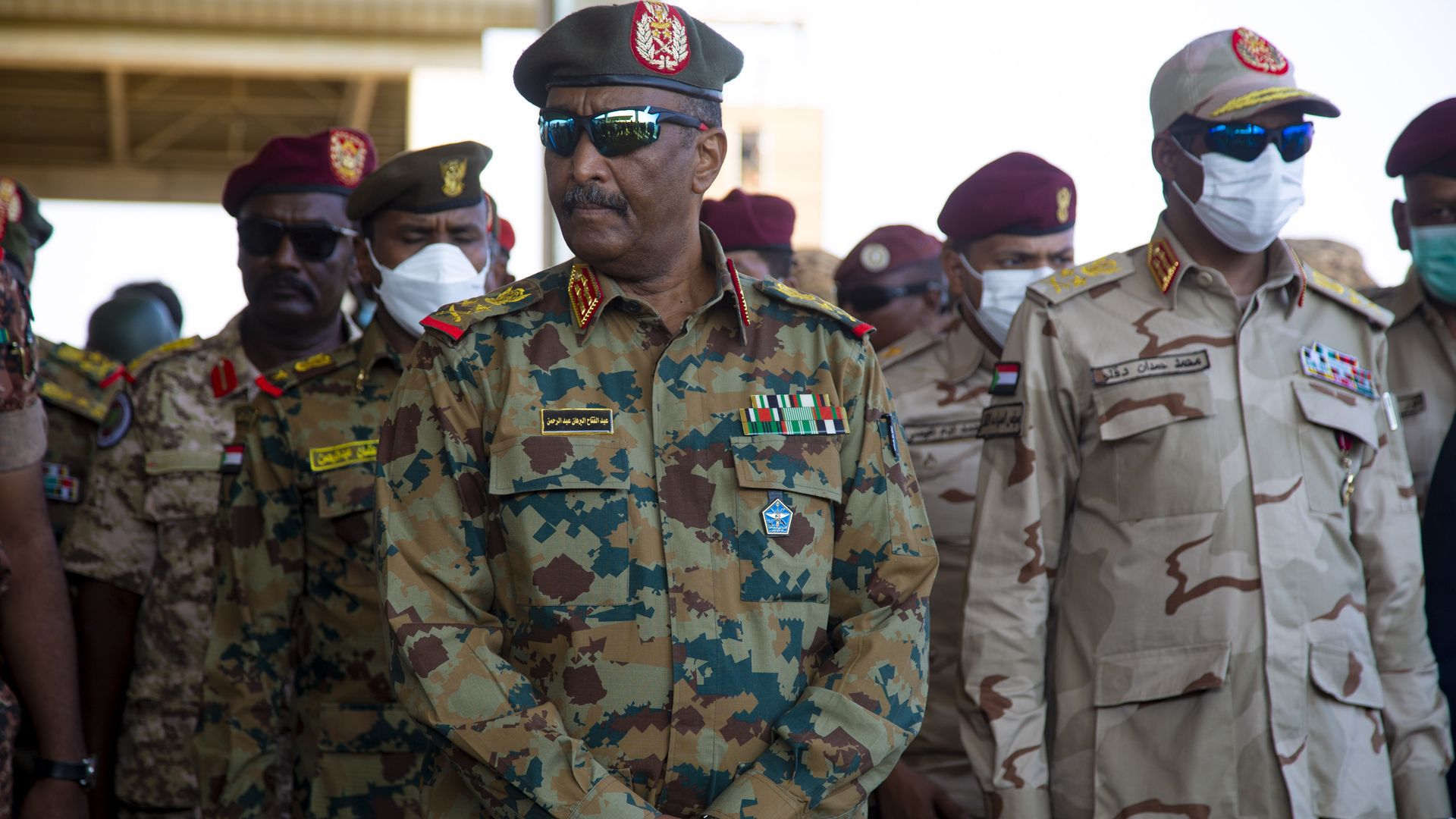Sudan military wants to take power without coup, civilian leader says
Add Axios as your preferred source to
see more of our stories on Google.

Burhan (center) and Dagalo attend a military graduation ceremony. Photo: Mahmoud Hjaj/Anadolu Agency via Getty
One of the most outspoken and high-profile civilian members of Sudan’s Transitional Sovereign Council (TSC), Mohamed Elfaki Suleiman, said in an interview that the military faction of the council wants to create a government it can control without staging a coup.
Why it matters: Sudan is facing a political crisis 2½ years after the fall of dictator Omar al-Bashir. Thousands took to the streets over the weekend to urge the military to take power, while anti-military demonstrations are planned for Thursday. The protests come just three weeks after a failed coup that the government blamed on Bashir loyalists.
The backstory: The TSC was formed after the revolution in 2019 to oversee a 39-month transition to democratic elections in 2022.
- Suleiman was one of five civilians nominated by the Forces of Freedom and Change (FFC) coalition to serve on the TSC, which in turn selected Abdalla Hamdok to serve as prime minister.
- Leadership of the TSC is supposed to transition from Gen. Abdel Fattah al-Burhan to a civilian in the coming months, and Suleiman is a strong contender to become the first civilian head of the council.
What's happening: Burhan and his deputy, Gen. Mohamed Hamdan Dagalo, have escalated their rhetoric against Hamdok's civilian government in recent weeks.
- They're calling for it to be dissolved and for a new government to include additional political factions (while still excluding Bashir's National Congress Party).
What he's saying: Suleiman, who spoke to Axios by phone from Khartoum, claimed Burhan was driven by ulterior motives.
- “Burhan does not want to stage a military coup right now because it will be very difficult under the current environment. However, he wants to produce a new political reality by creating a civilian government he can control," he said.
- Suleiman said Burhan plans to install allies inside the civilian government under the guise of expanding political representation, and the general believes now is the time to strike because of the fatigue and apathy of the Sudanese people over the tough economic situation and political infighting.
- He also accused Burhan and the military of forestalling reforms of state institutions — including the civil service, judiciary and security sector — which Suleiman said were essential for dismantling the "old state" and transitioning to democracy.
- For example, the military has had several meetings about the candidates to serve as chief justice, but it has not made any decision, Suleiman revealed. The post has been vacant since May.
The other side: Burhan said this week that he was committed to the transition to an elected civilian government. After the coup attempt, he said it was the military that was protecting the revolution from civilian politicians “who want to steal it,” rather than the other way around.
State of play: Leadership of the TSC is set to shift from Burhan to a civilian, but the timing is disputed.
- Suleiman dismissed the debate over the timing as a distraction used by the military to portray the civilians as squabbling over posts.
What’s next: Suleiman expressed "100% confidence" that Hamdok will not seek any secret deals with the military and insisted the Sudanese people would overwhelmingly resist any attempts at a military takeover, whatever their misgivings about Hamdok’s government.
- He asserted that the Constitutional Declaration that established the TSC can only be amended with the consent of both the FFC and the military and that it was up to the FFC and Hamdok — not the military — to determine the makeup of the government.
Bashir's fate
On the thorny issue of handing Bashir over to the International Criminal Court (ICC) to be charged with crimes against humanity, Suliman claimed the military wing was hesitant to proceed with extradition on the grounds that Bashir holds sensitive state secrets that pose a risk to national security.
- Suliman said he sees no obstacles to the TSC approving the cabinet decision to ratify the Rome Statute of the ICC.
Israel normalization
Suleiman dismissed reports that the military and civilian wings of the government are at odds over the decision to normalize ties with Israel.
- Sudan and Israel agreed last October to normalize relations, but the process stalled. The Biden administration is seeking to hold a signing ceremony in Washington in the coming weeks to formally conclude it.
- Flashback: Burhan met in Uganda with then-Israeli Prime Minister Benjamin Netanyahu in February 2020, and the general played a leading role in the decision to normalize ties.
Driving the news: Last month, Sudanese Foreign Minister Mariam al-Sadiq al-Mahdi was quoted by the UAE-based The National newspaper as saying, “There's not any sign of normalization with Israel."
- Al-Mahdi, the daughter of a former prime minister, is known to oppose talks with the Jewish state.
- Yes, but: Justice Minister Nasredeen Abdulbari held surprise meetings in Abu Dhabi last week with Israel's deputy prime minister and minister for regional cooperation.
What to watch: Suleiman said those opposing normalization within the government are a minority and the process will proceed.
- He also claimed that civilian members of the government had been angry about the Burhan-Netanyahu meeting because it was planned in secrecy without their input, not because they opposed links with Israel.
- Suleiman said he has no issues communicating with Israeli officials in accordance with government policies.
Go deeper: U.S. envoy to visit Sudan as "most dangerous" crisis intensifies.
